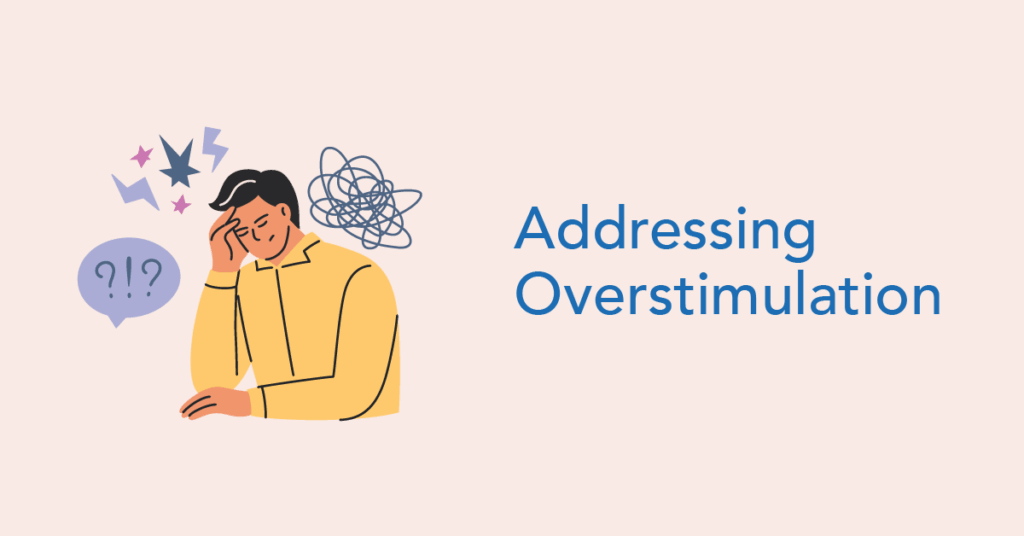Whether it’s a noisy room, a hectic day or an intense emotional conversation, feeling overstimulated is a common experience for many people. For some, it passes quickly. For others, especially those with sensory sensitivities, trauma or neurodivergence, overstimulation can be deeply disruptive and difficult to manage.
Learning to recognize, prevent and recover from overstimulation is essential to mental health care and self-regulation.
What Is Overstimulation?
Overstimulation occurs when the brain can’t filter or process the volume of information it’s receiving. This can involve sensory input (like light, sound or texture), emotional input (like arguments or high-pressure interactions) or cognitive demands (like multitasking or decision-making fatigue).
When your system gets overloaded, you may feel:
- Tired or Irritable
- Anxious or Panicked
- Shut Down or Frozen
- Sensitive to Noise, touch or crowds
- Unable to focus or communicate clearly
What Causes Overstimulation?
The causes of overstimulation can vary from person to person, but it often arises when multiple forms of input pile up too quickly for the brain to regulate effectively.
Common causes include:
- Loud environments like concerts, restaurants or busy offices
- Emotional conflict or overstimulating conversations
- Bright lights, flashing screens or crowded visual fields
- Long periods of social interaction without breaks
- High-pressure situations or multitasking
- Sleep deprivation, hunger or chronic stress
- Trauma triggers or flashbacks
People who are neurodivergent, including those with autism, ADHD and sensory processing disorder, may be especially prone to overstimulation due to increased sensitivity in sensory or emotional systems.
Overstimulated Symptoms: What It Feels Like
Overstimulated symptoms can be physical, emotional or mental. You might notice:
- Headache or muscle tension
- A racing heart or shallow breathing
- Emotional outbursts or tearfulness
- Feeling frozen or numb
- Sudden exhaustion or brain fog
- Irrational anger or frustration
- The urge to escape or shut everything out
In children, overstimulation can manifest as meltdowns, hyperactivity or withdrawal. In adults, it may present more subtly as irritability or fatigue that builds throughout the day.
Over time, chronic overstimulation can lead to burnout, anxiety or sensory-related distress if not managed.
Overstimulation and the Nervous System
When overstimulation occurs, it activates the sympathetic nervous system, also known as the fight-or-flight response. Your body becomes hyperalert to incoming stimuli and tries to defend itself or shut down entirely to cope.
If you’ve experienced trauma or chronic stress, your nervous system may be more easily triggered into this state. Similarly, if you’re managing ADHD, autism or sensory differences, your brain may process sensory input with greater intensity and less filtering.
Recognizing that overstimulation is a biological response and not a personal failing is key to handling it with compassion and strategy.
How to Address Overstimulation in the Moment
When you’re already overstimulated, the goal is to reduce incoming input and help your body shift back into a regulated state. Here are some strategies.
- Find a Quiet, Dim Space
Remove yourself from loud or chaotic environments. Even 5 minutes in a calm space can reset your nervous system. - Regulate Your Breath
Slow, deep breathing signals your brain that it’s safe. Try box breathing or the 4-7-8 breathing technique. - Use Sensory Tools
Items like noise-canceling headphones, weighted blankets or sunglasses can help reduce sensory load. - Ground Yourself Physically
Run cold water over your hands, press your feet onto the floor or hold a grounding object. This anchors your mind in the present. - Limit Communication Temporarily
It’s okay to tell others, “I need a break” or “I’m feeling overwhelmed and need quiet.” Boundaries are a tool for regulation.
Preventing Overstimulation
Prevention is just as important as recovery. Here are ways to reduce the chances of becoming overstimulated:
- Schedule downtime between events or social interactions.
- Use planners or timers to avoid cognitive overload.
- Take sensory breaks throughout the day.
- Reduce background noise when working or relaxing.
- Monitor caffeine, sugar and overstimulating content.
- Prioritize sleep, hydration and nutrition.
If overstimulation is part of your daily life, it may be helpful to create a self-regulation plan that includes a sensory toolkit, calming rituals and structured breaks.
When to Seek Support
Occasional overstimulation is a normal part of modern life. However, it may be time to seek support if you’re overstimulated on a near-daily basis or if your reactions are disrupting your relationships or work.
You may benefit from working with a therapist or occupational therapist if you:
- Have a trauma history that causes sensory or emotional flooding
- Suspect neurodivergence but haven’t been diagnosed
- Experience frequent meltdowns, shutdowns or burnout
- Avoid environments or people due to overwhelm
- Struggle to regulate emotions without external tools
The Mental Health Hotline is a free, confidential resource where you can talk to someone about what you’re experiencing and connect with services tailored to sensory processing, trauma or emotional regulation.
Frequently Asked Question
Being overstimulated means your brain is receiving more sensory, emotional or mental input than it can process at once. This can lead to symptoms like irritability, exhaustion and emotional shutdown.
Loud noises, bright lights, crowds, emotional conflict, multitasking, sleep deprivation and trauma can cause overstimulation. People with sensory sensitivities or neurodivergence may be more prone to it.
Symptoms include anxiety, irritability, brain fog, shutdown, physical tension, emotional reactivity and a strong desire to escape or withdraw from the situation.
Step away from overstimulating environments, practice slow breathing, use grounding techniques and give your nervous system time to regulate. Creating a calming routine can help prevent future episodes.
Overstimulation is common in individuals with autism, ADHD, PTSD and anxiety disorders. Chronic stress and burnout can also make it worse.
You Deserve Calm
Being overstimulated doesn’t mean you’re too sensitive or weak. It means your nervous system is working overtime to protect you. Recognizing and honoring that signal is a step toward health. If overstimulation is affecting your daily life, relationships or sense of peace, the Mental Health Hotline is here to help, confidentially, freely and without judgment.
Editorial Team
-
 Written By: Mental Health Hotline
Written By: Mental Health HotlineMental Health Hotline provides free, confidential support for individuals navigating mental health challenges and treatment options. Our content is created by a team of advocates and writers dedicated to offering clear, compassionate, and stigma-free information to help you take the next step toward healing.
-
 Reviewed By: Raymond Castilleja Jr., LCSW-S
Reviewed By: Raymond Castilleja Jr., LCSW-S


